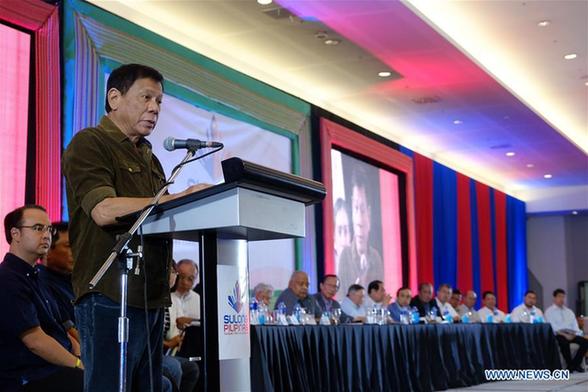Duterte's US visit to show how much he wants to align with China
- By Sumantra Maitra
 0 Comment(s)
0 Comment(s) Print
Print E-mail China.org.cn, May 3, 2017
E-mail China.org.cn, May 3, 2017
|
|
|
President-elect Rodrigo Duterte (front L) speaks during a business forum in Davao City, the Philippines, June 21, 2016. [Xinhua file photo] |
Trump officials, of course, defended the invitation. The geopolitical angle is familiar. America needs allies in Asia to address the global threat of North Korean missiles. Still, it's somewhat baffling that Trump should court Duterte, to balance North Korea, for what can the Philippines offer in this regard?
Surprisingly, Duterte's spokesperson was giddy about the invite. Ernesto Abella cited it as proof Duterte is doing a "great job" considering the enormity of the problems he inherited. It is important to mention that Duterte is extremely popular in Philippines, especially for his war on drug dealers and users, along with his support of farmers and his handling of the economy.
However, geopolitics is the key question. What does Duterte want? Is he serious about solidifying his alliance with China, or is he playing both sides – China and the U.S. – until he can get an offer he cannot refuse? Right now, the signals are mixed.
Duterte recently visited a Chinese warship in Davao City where he visibly softened his ASEAN stance with regard to China's territorial policies regarding the South China Sea. His visit was also heavily covered by media in the West.
"Very impressive, it's all carpeted inside. It's like a hotel," he was quoted as saying after being presented with a Chinese naval beret. "This is part of confidence-building and goodwill and to show we are friends, and that is why I welcome them [Chinese naval flotilla] here."
He also expressed a desire for joint military exercises with China, in the Sulu Sea. In comparison, he has said he wants to cut down the American presence and joint exercises with the U.S. This led his own Congress to accuse him of capitulating to China.
Theoretically it's all very good. It makes sense for a small power to jump on the bandwagon with a bigger giant, especially one right next door. Duterte has seen what happened to Gaddafi (Libya) and Mubarak (Egypt). Both aligned themselves with the West against Al Qaeda. Both were jettisoned when the time came. Gaddafi died and Mubarak was deposed in a Western backed putsch. The lessons were not lost on Duterte.
In international relations, a simple understanding is increasingly becoming clear to the leaders of small and medium powers, that leaders are not indispensable. With utility gone, they can be out of office in no time. Added to that is the idea that in the worst-case scenario, in a conflict, there will be no Western cavalry riding to the rescue.
However, that doesn't mean Duterte is actively seeking an alliance with China. Or maybe he is seeking one, but his approaches so far are showing mixed results. If he meets Trump, and is happy to find that the American president is not criticizing his drug policies, that would mean his position on the South China Sea is essentially flexible, and he is willing to lean towards anyone who will appeal to his personal ego.
That's not policy, and that shouldn't be what China or U.S. would base their policy on. My suggestion would be to focus on Duterte's actions and not his words. His upcoming U.S. visit may hold answers to a lot of questions.
Sumantra Maitra is a columnist with China.org.cn. For more information please visit:
http://china.org.cn/opinion/SumantraMaitra.htm
Opinion articles reflect the views of their authors only, not necessarily those of China.org.cn.






